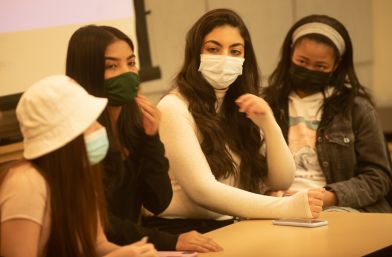
Puja Neopaney couldn’t express her need to use the bathroom in her fifth-grade class. Layal Srour’s parents were bullied throughout high school and college due to the language barrier.
Six students of the CRS Global Ambassadors held a panel to speak on their individual struggles with coming to the United States as immigrants.
Layal Srour, president of CRS Ambassadors, said, “I always had a sense that I didn’t belong.”
The sense of isolation was expressed on a personal level amongst the students. Neopaney’s family arrived in the U.S. with no resources.
“In middle school, I was made fun of so many times because I wasn’t pronouncing words correctly, as well as my accent,” Neopaney said. “My parents looked different than their classmates, they acted differently and they were treated differently due to not knowing the culture.”
Neopaney, being the youngest in her family, mentioned having to translate what her mom was saying at doctor’s appointments.
Gabriella Anastasia, 15 years old when she immigrated from Indonesia, emphasized the social aspects of coming to the U.S. as a teenager.
“Thankfully in Philly, we have a pretty big immigrant community. Also, going to a very diverse high school definitely helped a lot,” Anastasia said.
From taking additional English classes to watching television, each student found a unique way to learn the English language from scrap.
ESL (English as a Second Language) was a resource that a few students shared. The program is designed to help students who are looking to learn English as a second language.
Srour and Neopaney reflected on the cultural and religious differences between their family culture and that of the majority in the U.S. Neopaney was born in Nepal. Srour, while born in the U.S., visited Lebanon each summer.
“Growing up and being in a majority-white high school, they didn’t teach different religions and cultures; they only revolved it around what they celebrate and care about,” Srour said.
“We could never celebrate Dawali as we celebrate it back home… it just doesn’t feel complete,” Neopaney said.
A sense of comfort and belonging was expressed as the ultimate goal at the panel.
“Don’t judge a book by its cover. Just because they look different doesn’t mean you should treat them differently; actually get to know who they are on the inside, not so much of how they look on the outside,” Srour said.
“For someone who doesn’t speak English, try to make them feel comfortable with how they’re saying things,” Neopaney said.
Neopaney mentioned not seeing anyone of her race when arriving at Cabrini.
“You always relate to people who are from your background,” she said.
Cabrini, which strives in establishing a multicultural/inclusive environment, was evaluated on a social spectrum during the panel.
“The school tries to make us feel inclusive and bring in more diversity; but I don’t think we’re as diverse,” Neopaney said.
Srour emphasized the importance of having more of these types of conversations in order to create a more diverse environment at Cabrini.
“It is important to have uncomfortable conversations such as these because it will allow students and faculty to get out of a bubble, or group-thinking, and pay attention to the people and the world around their own and what they are used to,” Srour said.
Srour also touched on the benefits of hosting more of these panels/events on campus.
“It does not always have to be a panel, it can be conversational or something more hands-on and participatory. But I think holding these events can bring more people together and learn about one another’s background and experiences,” Srour said.
This panel is a step in the right direction for the small liberal arts school to bring more awareness to topics of diversity and inclusion.


